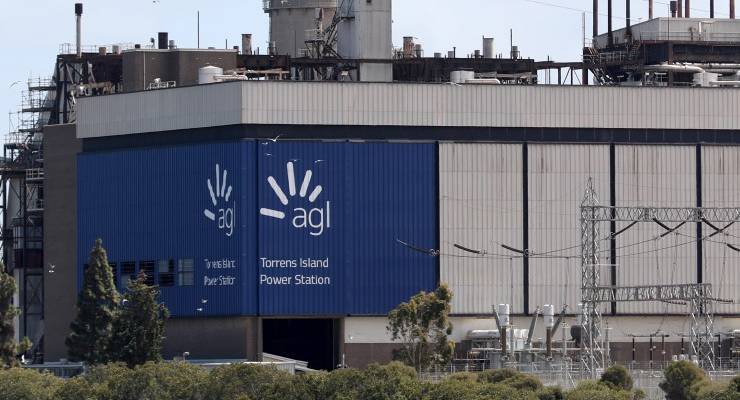
While Prime Minister Scott Morrison and Energy Minister Angus Taylor’s climate denialism — and their waste of billions on gas and the carbon capture and storage scam — are dictated by fossil fuel company donations, not all fossil-fuel companies are the same. And the government’s denialism has affected some differently from others.
Take AGL. More than 180 years old, allegedly the second company to be listed on the ASX, and one of Australia’s biggest carbon emitters from its fleet of coal-fired power stations and gas supply.
It has announced plans to break itself into two companies — one to own its coal-fired power stations, the other to hold its more appealing renewable assets, plus the huge and cash-rich retail power and gas businesses. The latter will be free to buy its electricity from the cheapest source– which won’t be its old fossil-fuel assets, given solar and wind are now the cheapest forms of power available.
There will continue to be a cross-holding between the companies, which will provide some disincentive to abandon fossil fuels completely, but the fossil-fuel company, to be called Accel Energy, is going in only one direction: down. It’s selling a product investors don’t want to touch and which, even according to fossil-fuel advocates like the International Energy Agency, has a lifespan measured in years, not decades.
Recent years have not been kind to AGL. Two years ago it was valued at more than $15 billion by the sharemarket. This week, when it confirmed the move to split, that had shrunk to $5.67 billion.
That’s partly because the vacuum in energy policy in Australia, and the lack of a national decarbonisation path, has left investors and major financial institutions having to make their own decisions about where to invest in energy supply. Overwhelmingly they’ve abandoned coal and are increasingly uneasy with gas. Coalminers routinely whinge they can’t get finance to dig up the stuff that kills and sickens hundreds of Australians a year — before the carbon it produces goes into the atmosphere to heat the planet.
And despite being a fossil-fuel company, AGL’s ownership of coal-fired power plants made it a target of denialists and opportunists within the Coalition. When the company raised the future of its antique Liddell power station in the Hunter Valley in 2018 and announced a 2022 closure date, the company and its then-CEO, American Andy Vesey, were hectored and attacked by the Coalition — led by Malcolm Turnbull — and various state politicians, conservative commentators and Neanderthals from the National Party. How dare AGL question the viability of coal-fired power stations, no matter how uneconomic?
By coincidence, under Vesey, AGL had ceased its long practice of donating to political parties. Between the late 1990s and 2015, AGL gave $660,000 to political parties. Since then it’s had a strict no-donation policy and not a cent has flowed to either the Coalition or Labor at state or federal level, according to Electoral Commission records. It probably helped that in NSW in 2017, AGL got pinged with a $124,000 fine for not disclosing donations up to 2014.
After being belted as some sort of green lunatic for wanting to shutter a dud asset, Vesey decided he’d had a gutful. New management arrived, the split proposal emerged, management changed again earlier this year — and all the while its value kept falling. AGL’s share price is down more than 11% since the announcement on Wednesday of the split — a drop of more than half a billion dollars.
Not only will the company’s 2020-21 results be the final as the combined company, they will be weaker than they were thought 10 months ago. AGL has already taken over $1.8 billion in write-downs in the value of some assets (and power contracts signed with wind farms at prices now well above market, and with no hope of being recouped).
AGL has taken two key steps to keep as much cash in the business as possible by dropping special dividends and restarting a dividend reinvestment program. That will keep more than $400 million or more in AGL while the split happens and support Accel if it has cashflow problems from lower power prices, falling sales and investor antipathy.
Perhaps if AGL had kept donating it would have fared better in 2018. But the economics of coal-fired power are the problem — and the refusal of Morrison to consider any sort of path forward to provide certainty for boards and investors alike.









The LNP will be oblivious. Remember, Scotty doesn’t read.
“Neanderthals from the National Party”? There’s no need to insult Neanderthals like that – there’s nobody in the Nationals that’s anything like as evolved as them
Is there any link between separating these companies and the possibility of stiffing the Aussie public with the left over and declining coal company that ends up financially unable to rehabilitate their coal assets? i.e. coal stations full of asbestos that the Aussie public has to fund the dismantling of and the giant holes in the ground that need to have something done with them so that another disastrous Morwell coal fire can’t happen?
Undoubtedly that’s part of the plan, Jennifer.
Scotty’s attention floats about like the breeze, er, flow of donations/bribes.
AGL could save itself by repainting itself as a seller of energy, not as a seller of (fossil) fuels. After all, it understands its customers and is in a position to persuade them to buy (nonfossil) electricity rather than fuel for their doomed fossil-burning plants. AGL’s engineers are able to select and acquire the necessary equipment. Its political connections allow it to stay in step with governments that demand progressive milestones in decarbonisation. By planning for a virtuous future, AGL could emerge mid-century as a guardian angel.